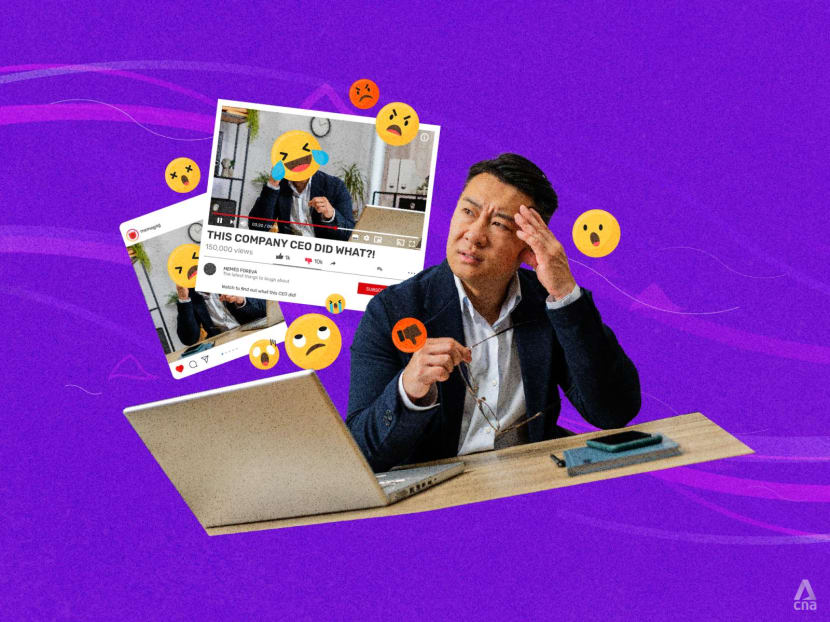When your company goes viral for the wrong reasons, what can you do to survive the fallout?
Virality can catapult a brand into the spotlight overnight or drag it into scandal. Business owner Kelvin Kao asks: Why do so many leaders struggle to respond?

There is no universal playbook for weathering viral storms, but the best responses share one trait, which is genuineness, business owner Kelvin Kao said. (Illustration: CNA/Samuel Woo, iStock)

This audio is generated by an AI tool.
"Going viral" is an odd phrase when you think about it.
It started as an epidemiological term for the rate at which contagion spreads. That's why it feels odd that in my field of advertising, we often celebrate virality, even though it often carries a hint of trouble.
In the age of social media, where everything – the good, bad and ugly – is amplified to the entire world in minutes, a viral video can showcase creativity and genius, but a single lapse in judgment can just as quickly spiral into catastrophe.
That hint of trouble became a full-blown scandal for the chief executive officer of American technology company Astronomer when a serendipitous pan of the camera at a Coldplay concert caught him having a romantic moment with a woman.
It was a picture-perfect moment, with one glaring problem: both of them were married – just not to each other. To add fuel to the fire, he was the CEO and she was the company's director of human resources.
The memes came quickly, but the fallout was serious. Both resigned soon after, leaving the company's future in jeopardy.
As a business owner, this gives me cold sweats just thinking about it.
If any of my employees were caught on video behaving inappropriately outside of work, the company would need to take swift action to mitigate any collateral damage. In a viral situation, such an incident could define the company's reputation, which is a frightening thought.
It would be like waking up to a beautiful, sunny morning and seeing a 100m-high tsunami right outside, about to swallow you whole.
WHEN GOING VIRAL BACKFIRES
Virality from chasing the latest trends can have a positive business impact, such as translating into higher traffic, more sales and better cultural relevance.
But going viral turns toxic fast when traffic or clicks come from outrage, ridicule or scandal.
The same algorithms that will surface a video of a street busker's perfect cover of Chappell Roan's runaway hit Good Luck, Babe will also push footage of a fight in a food court.
If you are the person in that video, your right to privacy suddenly vanishes in an instant.
Every stranger feels like they're entitled to an opinion of you – good or bad. In extreme cases, it could also lead to doxxing, where people leak your personal details online.
If you are the employer, the question comes hard and fast: What does this say about us and do we want our brand to be dragged into it?
Years ago, a client I was working with had to quietly pause a marketing campaign when production house Night Owl Cinematics faced several allegations online.
No contract had been breached, no laws broken, but the client pulled the plug anyway. They simply couldn't risk being tainted by association.
For the company's part, the instinct is usually to act quickly – issue a statement, suspend them, create distance.
But while the internet demands immediate action, the truth usually takes its time. What then should the company do in the meantime?
WHAT CAN BE DONE
There is no universal playbook for weathering viral storms, but the best responses have one thing in common: they show genuineness.
Sometimes that means handling it quietly. When a Cheers employee was filmed in a tense exchange with police at the convenience store's Lau Pa Sat outlet, the clip spread quickly.
But instead of issuing a lengthy public defence or condemnation, Cheers met with the staff member, placed the person on administrative leave and handled the matter quietly.
Other times, it calls for measured engagement, stepping in just enough to address the moment, but without adding unnecessary fuel to the fire.
When fashion accessories retailer Charles & Keith was caught in an online storm after a teenager called one of its bags a "luxury" gift from her father and was roundly mocked, the brand issued a brief, respectful statement on its "humble beginnings" and invited her to visit its headquarters.
And sometimes, it requires a clear public stance, especially when the behaviour contradicts what you claim to stand for or causes harm.
The inappropriate comments by the Singapore Democratic Party’s Gigene Wong at a General Election rally in April, and her subsequent apology, come to mind.
SORRY SEEMS TO BE THE HARDEST WORD
Speaking of apologies, it is fascinating how organisations tend to botch the act of saying sorry.
Perhaps it is an inherent need for self-protection, or a natural tendency to obfuscate their language with technical jargon. Whatever the reason, some come across as patronising, evasive and downright cowardly at times.
Take the example of the United Airlines CEO's viral statement regarding the forcible removal of a passenger in 2017.
He initially called it a "re-accommodating" of customers and blamed the passenger for being "disruptive and belligerent”.
The ensuing backlash to his condescending response was so severe that he issued a follow-up release that was much more apologetic in nature. By then, the reputational damage had been done.
Contrast this with the response of Singapore gelato shop Tom’s Palette to a suspension by the Singapore Food Agency last year.
Its representative spoke candidly about the brand's shortcomings by expressing genuine remorse and outlining the corrective actions taken. In return, people responded with grace and forgiveness.
In crisis moments, honesty, clarity and ownership matter far more than legalese.
People can tell the difference between real empathy and public relations spin, which is why in the age of virality, authenticity is not just important, it is pragmatic.
GETTING OUT OF THE WOODS
In the heat of a viral storm, the real test is whether your actions are guided by values or by the pressure to appease.
Knowing what to do in these high-stakes moments requires finesse – to balance kindness and compassion with decisive corrective action.
We’ve all made mistakes, just not always caught in 4K. So when there is genuine remorse and a willingness to change shown by those who have gone viral, we viewers should respond with grace and kindness, too.
If my company were to end up on the wrong side of the social media algorithm, I would take a deep breath, have the difficult conversation, then figure out the best way to move forward and hope it’s in the right decision.
It can be a fine line to tread, but in the end, it is not about winning over the loudest voices online, but being able to stand by your actions long after the frenzy fades.
Kelvin Kao is the co-owner of a creative agency.











